《中国的民主》白皮书(双语全文)
新华网 2021-12-07 14:21

三、具有具体现实的民主实践
III. Concrete and Pragmatic Practices
中国发展全过程人民民主,既有完整的制度程序,也有完整的参与实践。全过程人民民主,把选举民主与协商民主结合起来,把民主选举、民主协商、民主决策、民主管理、民主监督贯通起来,涵盖经济、政治、文化、社会、生态文明等各个方面,关注国家发展大事、社会治理难事、百姓日常琐事,具有时间上的连续性、内容上的整体性、运行上的协同性、人民参与上的广泛性和持续性,使国家政治生活和社会生活各环节、各方面都体现人民意愿、听到人民声音,有效防止了选举时漫天许诺、选举后无人过问的现象。
Whole-process people's democracy in China is a complete system with supporting mechanisms and procedures, and has been fully tested through wide participation. China's whole-process people's democracy is a combination of electoral democracy and consultative democracy, and is applied through a combination of elections, consultations, decision-making, management and oversight. It covers the economic, political, cultural, social, eco-environmental and other fields, with a focus on national development, social governance and people's lives.
Whole-process people's democracy is a comprehensive and coordinated system involving extensive and regular participation, ensuring that the people's voices are heard and their wishes are represented in every aspect of China's political and social life. Whole-process people's democracy prevents individuals from manipulating the political process to win elections, and leaves no room for politicians to shower promises while campaigning and break them all once elected.
(一)民主选举
1. Democratic Election
人民通过选举、投票行使权利,选出代表自己意愿的人来掌握并行使权力,是中国民主的一种重要形式,是人民实现当家作主的重要体现。
By exercising their right to vote in elections, the people elect those who represent their will to hold and exercise power. This is an important form of democracy in China, and a clear demonstration of the people's status as masters of the country.
中国的选举是广泛的,有国家机构选举、村(居)委会选举、企事业单位职工代表大会选举等,涵盖了国家政治生活和社会生活的各个方面;中国的选举是平等的,人民的选举权和被选举权得到充分保障,一人一票、票票等值;中国的选举是真实的,不受金钱操控,选民按照自己的意愿选出自己信任的人;中国的选举是发展的,选举形式手段随着经济社会的发展不断创新和丰富。
Elections in China are extensive and cover all aspects of the country's political and social life. They include elections to government institutions, villagers and urban residents committees, and employees congresses in enterprises and public institutions.
Elections in China are based on equality, and the people's right to vote and stand for election is fully guaranteed. Each person can cast one vote, and all votes are of equal value.
Elections in China are genuine and not manipulated by financial interests. Voters are free to vote for the candidates they trust.
Elections in China are progressing in a positive direction with the progress of the economy and society.
国家机构选举。国家机构选举是指,选举产生全国人民代表大会和地方各级人民代表大会,由各级人大选举产生同级国家机关领导人员。在中国,年满18周岁、具有中华人民共和国国籍、未被依法剥夺政治权利的公民,都有选举权和被选举权。从全国人大到乡级人大,五级人民代表大会代表均由民主选举产生,每届任期5年。按照普遍、平等、直接选举和间接选举相结合以及差额选举、无记名投票的原则,选民直接选举产生县乡两级人大代表,县级以上人大代表由下一级人大选举产生。各级国家机关领导人员均由同级人大选举产生或者决定任命。
Elections to state organs. These include elections to the NPC and the local people's congresses at all levels, and those in which deputies to people's congresses elect leading officials of state organs at the corresponding levels. All citizens of the PRC who have reached the age of 18 – with the exception of those persons deprived of political rights in accordance with the law – have the right to vote and stand for election.
In accordance with the principles of universal suffrage, equal rights, multiple candidates, and secret ballot, deputies to people's congresses at the township and county levels are elected directly by the public. Deputies to people's congresses at the city, provincial and national levels are elected by people's congresses at the next level below. All deputies are elected for a term of five years. Leading officials of state organs at various levels are appointed or elected by people's congresses at the corresponding levels.
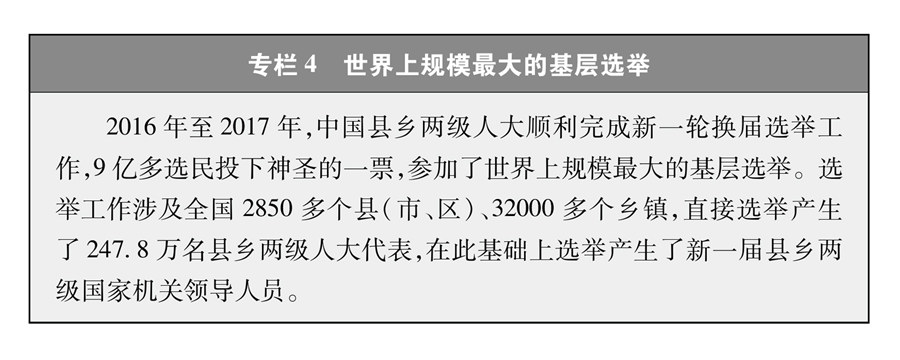
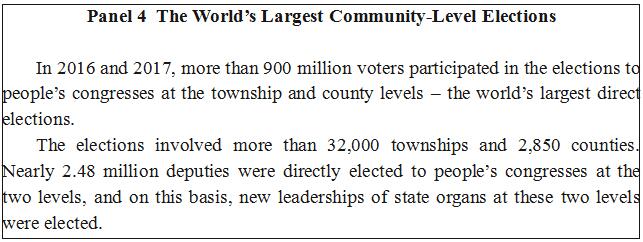
基层选举。基层选举是中国最广泛、最生动的民主实践,包括村(居)民委员会选举和企事业单位职工代表大会选举。村(居)民委员会由主任、副主任和委员组成,村(居)民委员会选举与县乡人大选举同步进行。村(居)民依法定期选举产生村(居)民委员会成员。在企事业单位中,职工代表大会是职工当家作主、行使民主管理权力的机构,职工代表由全体职工通过民主选举产生。
Community-level elections. Elections at the grassroots level are the most extensive and dynamic form of democracy in China. They include elections of villagers committees, urban residents committees, and employees congresses in enterprises and public institutions.
Villagers and urban residents committees are composed of chairpersons, vice chairpersons and members, and the elections are held simultaneously with those at the township and county levels.
Employees congresses – elected by all employees – are the bodies through which employees exercise their democratic management rights and make their own decisions in enterprises and public institutions.
中国的民主选举是符合中国国情的,是与中国的发展阶段相适应的,是随着经济社会发展与时俱进的。几十年来,中国适时修改选举法,选举全国人大代表时,农村和城市每位代表所代表的人口比例从新中国成立初期的8∶1,到1995年的4∶1,再到2010年的1∶1,逐步实现了城乡人口的平等选举。人们的民主意识不断增强,参选率不断提高。改革开放以来,中国先后进行12次乡级人大代表直接选举、11次县级人大代表直接选举,选民参选率均保持在90%左右。
China's democratic elections are adapted to the country's national conditions and stage of socio-economic development. Over recent decades, theElectoral Law of the National People's Congress and Local People's Congresseshas been amended progressively. The ratio of deputy representation in people's congresses has been optimized – in 1953 there was an imbalance between urban areas and rural areas that gave urban residents eight times more representation than rural residents. By 1995 this ratio had fallen to 4:1, and by 2010 there was parity – urban and rural residents had equal levels of representation.
As the understanding of democracy has grown, so has the number of people participating in elections. Since the initiation of reform and opening up, China has held 12 direct elections to people's congresses at the township level and 11 direct elections to those at the county level, with a current participation rate of about 90 percent.
(二)民主协商
2. Democratic Consultation
有事好商量,众人的事情由众人商量,找到全社会意愿和要求的最大公约数,是人民民主的真谛。人民在通过选举、投票行使权利的同时,在重大决策前和决策过程中进行充分协商,尽可能就共同性问题取得一致意见。协商民主是中国民主独特的、独有的、独到的民主形式。
Whenever a problem occurs, those concerned should always hold deliberations in good faith. Matters involving many people are discussed by all those involved; to reach the greatest common ground based on the wishes and needs of the whole of society is the essence of people's democracy. The Chinese people widely exercise their right to vote in elections and undertake extensive deliberations before major decisions are made. Democratic consultation is a special feature of democracy in China.
具有深厚基础。协商民主源自中华民族长期形成的天下为公、兼容并蓄、求同存异等优秀政治文化,源自近代以后中国政治发展的现实进程,源自中国共产党领导人民进行不懈奋斗的长期实践,源自新中国成立后各党派、各团体、各民族、各阶层、各界人士在政治制度上共同实现的伟大创造,源自改革开放以来中国在政治体制上的不断创新,具有深厚的文化基础、理论基础、实践基础、制度基础。
Democratic consultation has been established on the basis of solid cultural, theoretical, practical and institutional foundations. It derives from the best of traditional Chinese culture, including such ideas as aspiring for the common good, mutual understanding and inclusiveness, and seeking common ground while setting aside differences.
It comes from years of tenacious struggle by the Chinese people led by the CPC.
It originates from the political system created by all parties, organizations, ethnic groups, social groups and people from all walks of life since the founding of the PRC.
It also stems from China's continuous innovation in its state institutions since reform and opening up.
形式广泛多样。在各领域各层级,人民群众就改革发展稳定的重大问题以及事关自身利益的问题,通过提案、会议、座谈、论证、听证、评估、咨询、网络、民意调查等多种途径和方式,在决策之前和决策实施之中开展广泛协商。涉及全国各族人民利益的事情,在全体人民和全社会中广泛商量;涉及一个地方人民群众利益的事情,在这个地方的人民群众中广泛商量;涉及一部分群众利益、特定群众利益的事情,在这部分群众中广泛商量;涉及基层群众利益的事情,在基层群众中广泛商量。
Democratic consultation takes many forms. In making and implementing decisions on major issues concerning reform, development and stability, and on matters bearing on the vital interests of the people, China conducts extensive consultations in all fields and at levels through various channels, including proposals, conferences, discussions, seminars, hearings, assessments, consultations, the internet, and opinion polls.
On matters that have a bearing on the interests of everyone, extensive consultations will be held throughout the whole of society; on matters that concern the interests of people in one specific region, consultations will be held locally; on matters that affect the interests of certain groups of people, consultations will be held among those groups; and on matters that concern the interests of a community, consultations will be held within the community.
体系不断健全。中国不断完善协商民主的发展路径,探索形成了政党协商、人大协商、政府协商、政协协商、人民团体协商、基层协商、社会组织协商等协商渠道,推动协商民主广泛多层制度化发展。政党协商,是中国共产党就中共全国代表大会和中共中央委员会的有关重要文件、宪法修改、有关重要法律的制定和修改、国家领导人建议人选、国民经济和社会发展的中长期规划以及年度经济社会发展情况、关系改革发展稳定等重要问题、统一战线和多党合作的重大问题等,同民主党派开展协商;人大协商,是各级人大在依法行使职权中与有关国家机关、社会组织、专家学者、人民群众开展协商;政府协商,是各级政府在履职尽责中与人大代表、政协委员以及民主党派、无党派人士、相关人民团体、社会组织以及群众代表等加强沟通协商;政协协商,是在中国共产党领导下,参加人民政协的各党派团体、各族各界人士履行职能,围绕改革发展稳定重大问题等,在决策之前和决策实施之中广泛协商、凝聚共识;人民团体协商,是人民团体就涉及群众切身利益的实际问题,特别是事关特定群体权益保障的,加强与政府相关部门的协商,积极参与政协组织的协商活动;基层协商,是基层党组织、基层政府、基层群众性自治组织、经济社会组织和群众等,就基层社会发展及事关群众切身利益的问题开展协商;社会组织协商,是各类社会组织就更好为社会服务,积极开展和参与协商。这七种协商渠道,极大丰富了民主形式、拓宽了民主渠道、加深了民主内涵。
The system of democratic consultation has improved. To promote the broad-based, multilevel and institutionalized development of consultative democracy, China has explored and expanded consultation channels to include consultations carried out by political parties, people's congresses, government departments, CPPCC committees, people's organizations, social organizations, and communities.
•The CPC and other political parties carry out consultations on major documents of the CPC National Congress and the Central Committee, the revision of the Constitution, the formulation and revision of major laws, the selection of candidates for state leaders, medium and long-term programs of socio-economic development, annual plan of socio-economic development, and major issues related to reform, development and stability, the united front, and multiparty cooperation.
•In exercising their functions and powers, people's congresses at all levels engage in deliberations with government departments, social organizations, experts and academics, and the general public.
•Governments at all levels, when performing their duties, strengthen communication with deputies to people's congresses, members of CPPCC committees, and representatives from the other political parties, the non-affiliates, people's organizations, social organizations, and all sectors of society.
•Under the leadership of the CPC, the CPPCC carries out extensive consultations and build consensus on matters concerning reform, development, and stability.
•People's organizations conduct consultations with relevant government departments on matters concerning the people's vital interests, especially those concerning the rights and interests of particular groups, and participate in consultations organized by the CPPCC.
•CPC organizations, government departments, and people's organizations for self-governance at the grassroots level, economic and social organizations, and local people deliberate over issues concerning the development of local communities and the vital interests of the people.
•Social organizations participate in or carry out consultations to better serve society.
With these seven consultation channels in place, China practices a rich and extensive form of democracy.
中国的协商民主,广开言路,集思广益,促进不同思想观点的充分表达和深入交流,做到相互尊重、平等协商而不强加于人,遵循规则、有序协商而不各说各话,体谅包容、真诚协商而不偏激偏执,形成既畅所欲言、各抒己见,又理性有度、合法依章的良好协商氛围,充分发扬了民主精神,广泛凝聚了全社会共识,促进了社会和谐稳定。
China draws on collective wisdom and promotes full expression and in-depth exchange of different ideas and viewpoints through democratic consultation. Parties to these consultations respect each other, consult on an equal footing, follow the rules, hold orderly discussions, stay inclusive and tolerant, and negotiate in good faith. In this way, a positive environment for consultation has been cultivated in which everyone can express their own views freely, rationally and in accordance with the law and rules. Through democratic consultation, China has built consensus and promoted social harmony and stability.
(三)民主决策
3. Democratic Decision-Making
民主决策是全过程人民民主的重要一环。好的决策,反映人民意愿,保障人民权益,增进人民福祉。在中国,察民情、听民声、顺民意,群策群力、集思广益成为常态,越来越多来自基层的声音直达各级决策层,越来越多的群众意见转化为党和政府的重大决策。
Democratic decision-making is an important link in China's whole-process people's democracy. Reflecting the will of the people, sound decision-making ensures their rights and interests and improves their wellbeing. In China, the standard practice is to hear people's voices, act on their needs, and pool their ideas and strength. More and more ideas and suggestions of the general public are flowing directly to decision-makers at all levels, and they are increasingly reflected in the major decisions of the Party and the government.
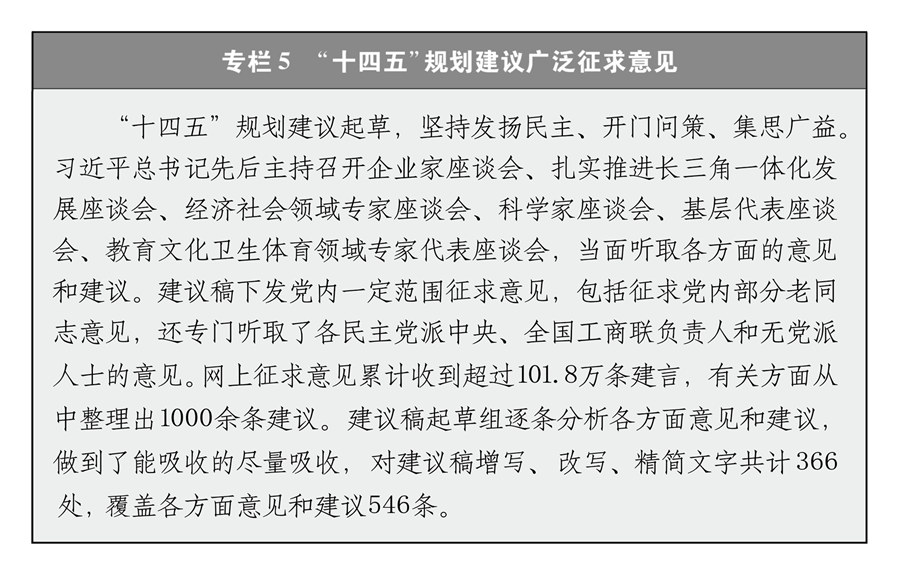
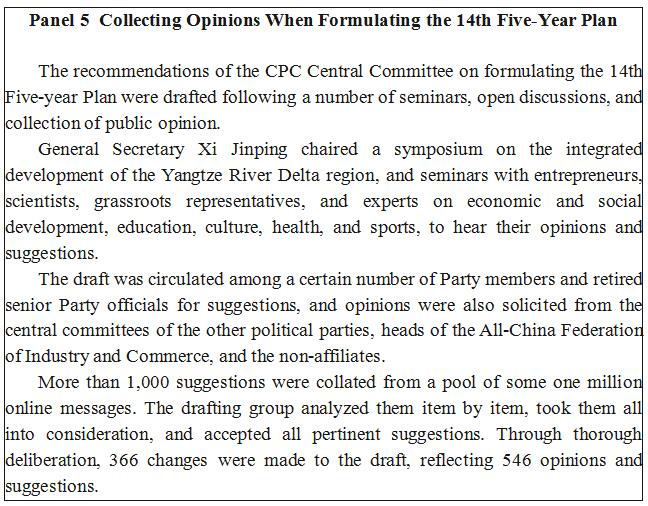
人大“开门立法”。各级人民代表大会及其常务委员会,坚持为民立法、民主立法,保障人民通过各种途径参与立法活动,努力让每一项立法反映人民意愿、得到人民拥护。法律立项,通过召开座谈会、听证会、论证会等方式,广泛听取意见,让人民的意志在立法的最初阶段就得到体现;法律草案起草,广泛听取公众意见和专业人士建议,探索委托第三方起草法律法规草案,让人民的诉求得到充分体现;法律草案公布,通过网络和新闻媒体,向社会各界广泛征求意见。基层群众通过基层立法联系点,直接参与法律草案的起草、立法调研、修改论证、立法后评估等多个环节。
Open-door legislation by the NPC. People's congresses at all levels and their standing committees are committed to democratic lawmaking in the public interest. To reflect their will in lawmaking, the people's participation in legislative activities is guaranteed through various channels, an approach that has won wide public support.
When a piece of legislation is proposed, seminars, hearings and discussions are held to widely solicit public opinion, so that the people's will is reflected from the very first stage of legislation. When a law is being drafted, professionals and the public are both consulted, and now third parties are entrusted to draft laws and regulations on a trial basis. When a draft law is released, it is subject to public review from online channels and news media. Through local legislative information offices, people can participate in the drafting, research, revision, evaluation, and post-assessment of draft laws.
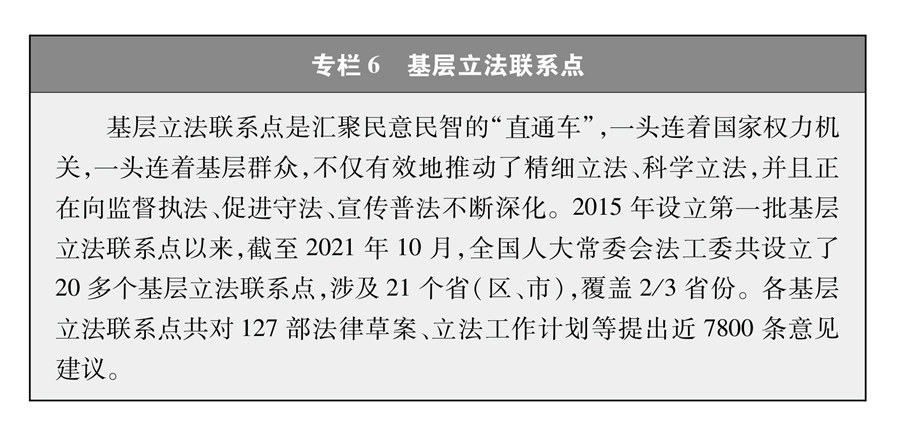
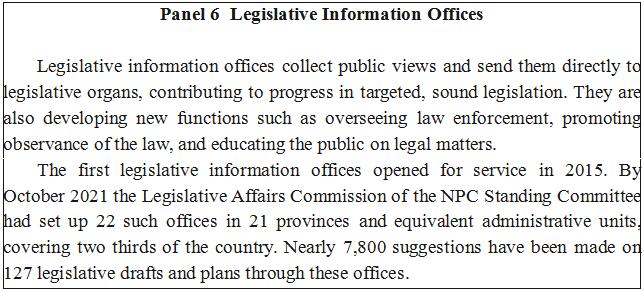
政府“开门问策”。各级人民政府就即将实施的重大决策和各方提出的重大决策建议,充分听取各方面意见,保障人民群众通过多种途径和形式参与决策。在决策启动环节,人大代表、政协委员通过建议、提案等方式提出建议,公民、法人和其他组织提出书面建议,决策机关启动决策程序;在决策研究制定环节,通过座谈会、公开征求意见、听证会、问卷调查、实地走访等方式,广泛听取社会各界特别是直接关系人的意见和建议;在决策草案公示环节,通过政府网站和各类媒体,公布决策草案及其说明材料;在决策最终确定环节,按照民主集中制原则,在集体讨论的基础上作出决定;在决策后评估阶段,听取社会公众意见,吸收人大代表、政协委员、人民团体、基层组织、社会组织和专家等参与评估。
Transparent decision-making by the government. Governments at all levels hear the opinions and suggestions of all sectors on major decisions. Public participation in decision-making is ensured in various forms and through multiple channels.
At the beginning of the decision-making process, deputies to people's congresses and CPPCC members make suggestions and proposals, and citizens, legal persons, and other organizations can file written suggestions. During the decision-making process, opinions and suggestions are collected from all social sectors, and especially from those directly concerned, through formats including seminars, hearings, questionnaires, and field trips.
For public information, the draft decisions and relevant explanatory notes are available on government websites and media portals. In the last step, the final decision is made after group discussion based on the principle of democratic centralism. In post-assessment, public opinion is solicited once more, and deputies to people's congresses, CPPCC members, people's organizations, grassroots organizations, social organizations, and experts in various fields are invited to participate.
广大群众参与基层决策。基层群众通过村(居)民会议、村(居)民代表会议、村(居)民小组会议等形式,就经济社会发展、基础设施建设、社会综合治理、基层文化服务、生态环境保护、自治章程制定等基层治理中的重大问题提出意见建议,参与决策制定和实施。
Grassroots decision-making. This happens in various forms of meeting among rural villagers and urban residents or their representatives, on a wide range of subjects such as the economy and society, infrastructure, social management, cultural services, eco-environmental conservation, the formulation of self-governance regulations, and other key matters in local governance. Rural villagers and urban residents also take part in carrying out the decisions they have reached.
(四)民主管理
4. Democratic Management
人民的事人民管,人民的事人民办。在中国,广大人民弘扬主人翁精神,发挥主体作用,积极行使民主权利,通过各种途径和形式,管理国家事务,管理经济和文化事业,管理社会事务。
In China, the people manage their own affairs. They are the masters of the country and exercise their democratic rights accordingly, managing affairs of the state, the economy, culture, and society through various channels and in many forms.
参与国家政治生活和社会生活的管理。人民行使宪法赋予的各项权利并承担宪法赋予公民的责任和义务,积极主动参加选举、协商、决策、监督等,在各个层级、各个领域参与国家政治生活和社会生活的管理,知情权、参与权、表达权、监督权得到有力保障。
Participation in the management of political and social life. The people exercise their rights and fulfill their obligations as prescribed by the Constitution. They participate in elections, consultations, decision-making, and oversight, and manage other areas of political and social life, fully enjoying their rights of information, participation, expression, and scrutiny.
城乡社区民主管理。根据宪法法律和有关规定,农村和城市社区居民结合本地实际,由村(居)民讨论制定村(居)民自治章程、村规民约、居民公约等,明确规定村(居)民的权利和义务,村(社区)各类组织之间的关系和工作程序,以及经济管理、社会治安、消防安全、环境卫生、婚姻家庭、邻里关系、计划生育、精神文明建设等方面的自治要求,普遍实现村(居)民在基层公共事务和公益事业中的自我管理、自我服务、自我教育、自我监督。
Democratic management of urban and rural communities. As per the Constitution, relevant laws and regulations, urban and rural residents can set rules and conventions to govern their communities. Through discussion, they can decide residents' rights and obligations, the coordination rules and procedures between local organizations, and general principles for the collective economy, neighborhood security, fire safety, community sanitation, marriage, neighborhood relations, family planning, and activities concerning cultural progress. All urban and rural communities are run by their residents, who manage the public affairs and public services in their communities, exercise self-supervision, and seek to improve their lives.
企事业单位民主管理。全国超过1.5亿市场主体自主经营、自我管理、活力迸发,承载7亿多人就业,推动了中国经济总量、国家财力和社会财富稳定增长。根据宪法法律和有关规定,企事业单位普遍建立以职工代表大会为基本形式,以厂务公开制度、职工董事制度、职工监事制度为主要内容的民主管理制度。职工通过这些民主管理制度,参与企事业单位管理,维护单位职工合法权益,实现单位与职工协商共事、机制共建、效益共创、利益共享。目前,全国已建工会企业中,建立职工代表大会的企业有314.4万家,其中,非公有制企业293.8万家、占93.4%。
Democratic management of enterprises and public institutions. With autonomy in their business operations and management, more than 150 million market entities are thriving across the country, providing job opportunities to over 700 million people, increasing China's national strength and promoting steady growth in economic and social wealth.
In accordance with the Constitution, relevant laws and regulations, enterprises and public institutions are run under democratic management through their employees congresses. The framework features disclosure of information on the affairs of enterprises, and systems for employees to serve on the board of directors and the board of supervisors. Under this framework, employees participate in business management, and protect their own legitimate rights and interests. In this way enterprises and their employees develop and maintain management mechanisms through consultation, and share the benefits they create.
A total of 3.14 million enterprises have established employees congresses, including 2.94 million private enterprises.
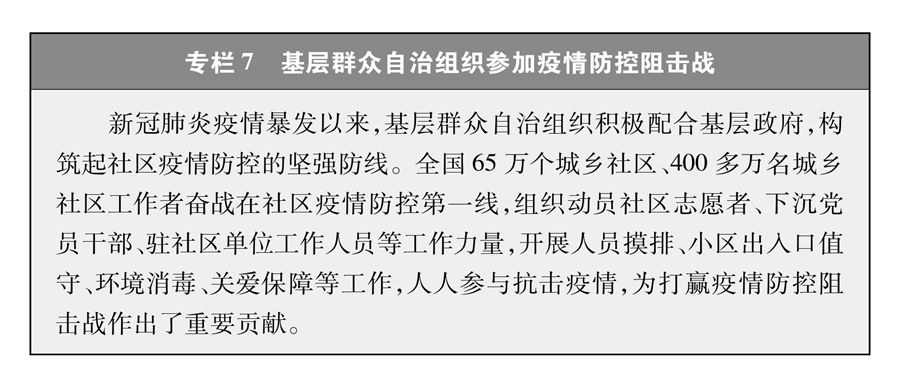
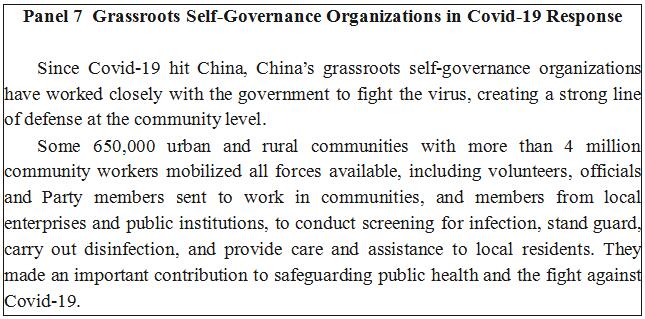
社会组织民主管理。社会团体、基金会、社会服务机构等社会组织,普遍制定章程,加强组织成员管理,自主开展活动,集中组织成员或服务对象的意见建议,以组织化的方式积极参与社会公共事务治理,在行业自律、社会服务、慈善事业等领域发挥民主管理作用。截至2021年11月,各级民政部门共登记社会组织超过90万家,其中全国性社会组织2284家。形式多样的社会组织成为人民民主管理的重要领域。
Democratic management of social organizations. Associations, foundations, social services and other social organizations formulate their own charters and exercise autonomy in managing their staff and activities. They address the concerns of their staff and clients, and hear their opinions. They participate in the governance of public affairs as appropriate to their role, and contribute to improving professional discipline, public services and charitable undertakings.
As of November 2021, more than 900,000 social organizations were registered with departments of civil affairs at all levels, including 2,284 with national networks. Diverse in form, social organizations have become an important area of people's democratic management in China.
(五)民主监督
5. Democratic Oversight
全面有效的民主监督,保证人民的民主权利不因选举结束而中断,保证权力运用得到有效制约。在中国,解决权力滥用、以权谋私的问题,不能靠所谓的政党轮替和三权分立,要靠科学有效的民主监督。中国结合本国实际,探索构建起一套有机贯通、相互协调的监督体系,形成了配置科学、权责协同、运行高效的监督网,对权力的监督逐步延伸到每个领域、每个角落。
Comprehensive and effective democratic oversight enables the people to continue to exercise their democratic rights after elections, and ensures that there is an effective check on the exercise of power. In China, the abuse of power for personal gain is not eradicated by the rotation of ruling parties or separation of powers, but by sound, effective democratic oversight. Taking into consideration its own conditions, China has explored a coordinated system of oversight and established a well-defined, efficient supervisory network with clear functions and responsibilities. Supervision of power extends across every area and into every corner.
人大监督。人民代表大会充分发挥作用,对宪法法律的实施、重大决策部署的落实等开展监督。各级人大及其常委会加强对“一府一委两院”执法、监察、司法工作的监督,确保法律法规得到有效实施,确保行政权、监察权、审判权、检察权得到正确行使。人民通过人大代表座谈会、基层群众座谈会、问卷调查、网络调研等“开门监督”的形式,积极参与人大监督工作。
Supervision by people's congresses. People's congresses play their full role in overseeing the enforcement of the Constitution and laws, and the implementation of major decisions and plans. The people's congresses at all levels and their standing committees have strengthened their efforts to oversee judicial, supervisory and law enforcement work by the government, supervisory commissions, people's courts, and people's procuratorates, to ensure that laws and regulations are observed and that administrative, supervisory, judicial and procuratorial powers are exercised properly. The people actively participate in supervisory work of the people's congresses by various means such as forums of NPC deputies, meetings of people from the grassroots, questionnaires, online research, etc.
民主监督。中国共产党支持民主党派和无党派人士在坚持四项基本原则基础上,在政治协商、调研考察,参与党和国家有关重大方针政策、决策部署执行和实施情况的监督检查,受党委委托就有关重大问题进行专项监督等工作中,通过提出意见、批评、建议等方式,进行民主监督。参加人民政协的各党派团体和各族各界人士在政协组织的各种活动中,依据政协章程,重点就党和国家重大方针政策和重要决策部署的贯彻落实情况,以提出意见、批评、建议的方式进行协商式监督,协助党和政府解决问题、改进工作、增进团结、凝心聚力。
Supervision by non-CPC political parties. The CPC encourages the other political parties and the non-affiliates to exercise democratic oversight by expressing views, making criticism and giving advice as they participate in political consultation, conduct field work, take part in inspection and oversight of the implementation of major policies, decisions and plans of the Party and the state, and carry out targeted scrutiny over major issues as entrusted by CPC committees, while adhering to the Four Cardinal Principles – to keep to the path of socialism, to uphold the people's democratic dictatorship, to uphold the leadership of the CPC, and to uphold Marxism-Leninism and Mao Zedong Thought. The political parties, organizations, and prominent figures participating in the CPPCC can, in accordance with the CPPCC's charter, oversee in various activities organized by the CPPCC the implementation of major policies, decisions and plans of the CPC and the state by offering criticisms and suggestions. Their assistance to the CPC and the government in solving problems and improving their work increases solidarity.
行政监督。国家行政机关按照法定的权限、程序和方式,对行政机关自身的组织行为、行政行为进行监督,包括各行政机关自上而下、自下而上以及相互之间进行的监督。
Administrative supervision. The state administrative organs, in accordance with their statutory authority, procedures and methods, supervise their own operational and administrative acts. Different organs supervise each other, and conduct internal supervision from top to bottom and from bottom to top.
监察监督。监察机关依法履行监察监督职责,对公职人员政治品行、行使公权力和道德操守情况进行监督检查,督促有关机关、单位加强对所属公职人员的教育、管理、监督。
Oversight by supervisory commissions. Supervisory commissions perform their duties of supervision as provided for by the law. They examine the political conduct of public servants and supervise their exercise of public power and their fulfillment of professional ethics; they can also urge relevant organs and units to strengthen education, management and supervision of their staff.
司法监督。审判机关和检察机关依照法定职权和程序对人民授权的国家公权力进行监督。司法监督是党和国家监督体系中强制性程度最高的一种监督机制,是党和国家利用监督手段、维护公权力正确行使的“最后一道防线”。
Judicial supervision. The judicial and procuratorial organs, in accordance with their statutory purview and procedures, supervise the exercise of public power mandated by the people. Judicial supervision is the most forceful form of oversight of the CPC and the state; it is the ultimate "line of defense" to ensure lawful exercise of public power.
审计监督。审计机关依法对本级各部门和下级政府预算的执行情况和决算以及其他财政收支情况,进行审计监督。
Auditing supervision. Auditing organs at each level inspect budget performance, audit the final accounts and the revenues and expenditures of the departments at their level and of lower-level governments.
财会监督。财政部门根据法律授权,对财政、财务、会计管理的法律、行政法规、部门规章等执行情况进行监督。
Fiscal and accounting supervision. Financial departments are legally empowered to supervise the enforcement of laws, administrative regulations, and departmental regulations that govern fiscal and accounting affairs.
统计监督。统计部门及负有统计调查职责的相关机关,对所有行使统计权力、负有统计义务的组织和人员进行监督,防范和惩治统计造假、弄虚作假,确保统计资料真实准确、完整及时,为经济社会发展提供扎实的统计保障。
Statistical supervision. Statistical departments and relevant offices with statistical functions and duties supervise all organizations and personnel producing official statistics, to prevent and punish falsification, and ensure that statistical data are authentic, accurate, complete, and up to date, providing reliable reference for planning economic and social development.
群众监督。公民、法人或者其他组织通过各种方式,对各级国家机关及其组成人员履职情况进行监督,既可以依法申请行政复议、提起行政诉讼,也有权向监察机关检举控告监察对象不依法履职,违反秉公用权、廉洁从政从业以及道德操守等规定,涉嫌职务违法、职务犯罪行为。
Public supervision. Citizens, legal persons and other organizations supervise the performance of state organs and their staff. They can request administrative review, initiate administrative litigation, or file complaints or charges with supervisory organs against any misconduct or crime involving dereliction of duty, abuse of power, or violation of professional ethics.
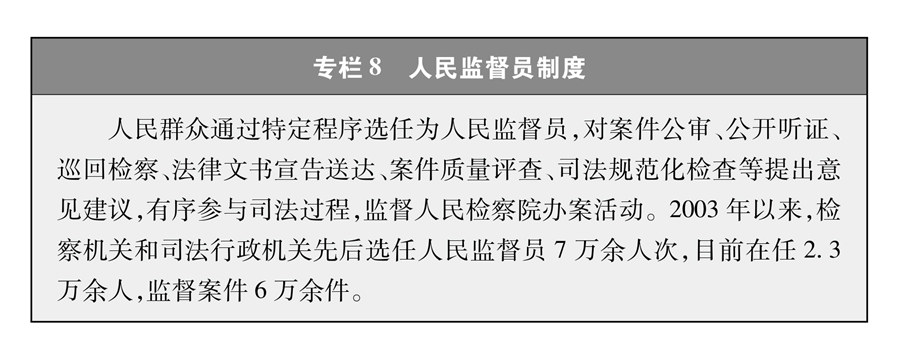
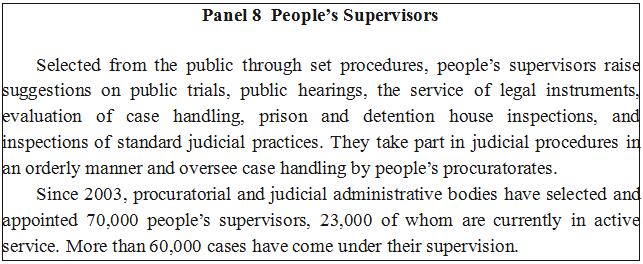
舆论监督。媒体充分发挥舆论监督作用,对滥用公权、失职渎职等行为及时揭露曝光。随着互联网的快速发展,人们更多地借助网络等平台,对各级国家机关和公职人员提出意见、建议和批评,网络在舆论监督中发挥着越来越重要的作用。
Supervision by public opinion. The media fulfill their supervisory role by representing public opinion, exposing in a timely manner abuses of public power, derelictions of duty, and acts of malfeasance. People are now relying more on the fast-growing internet and other platforms to offer criticisms and suggestions on the work of state organs and public servants at all levels. The internet is playing a bigger part in facilitating supervision by public opinion.









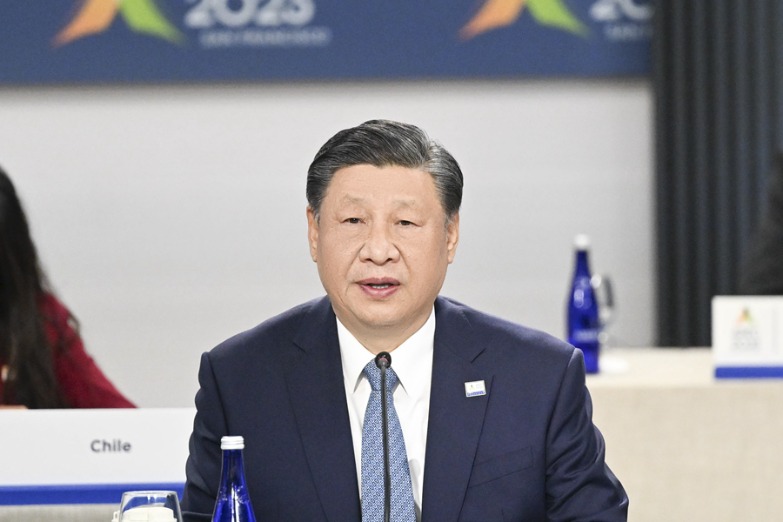
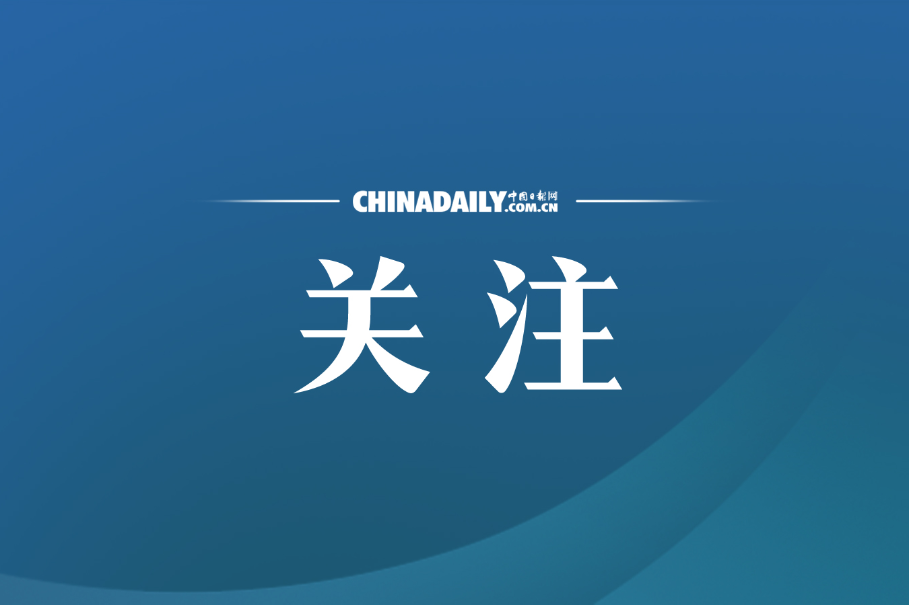
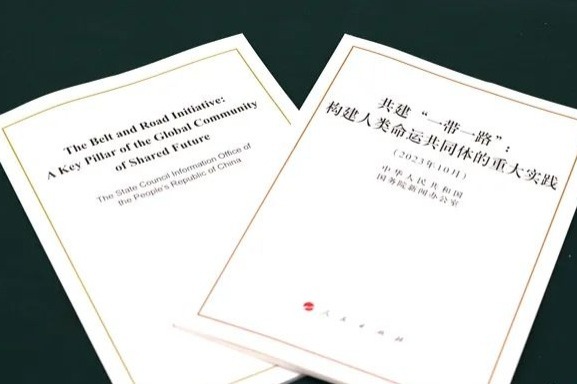
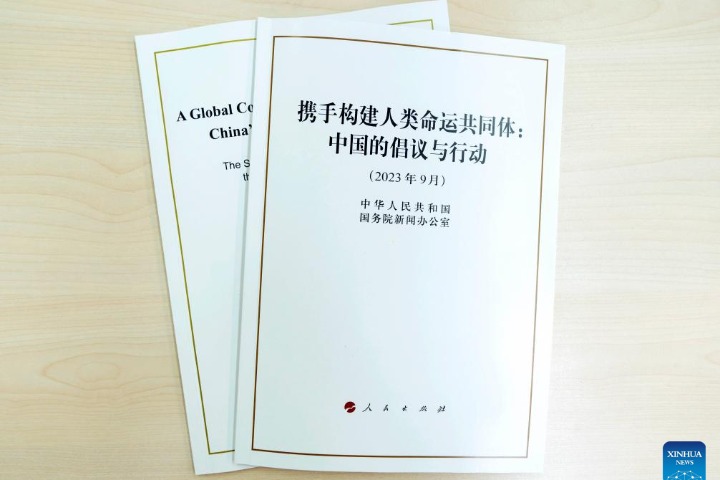
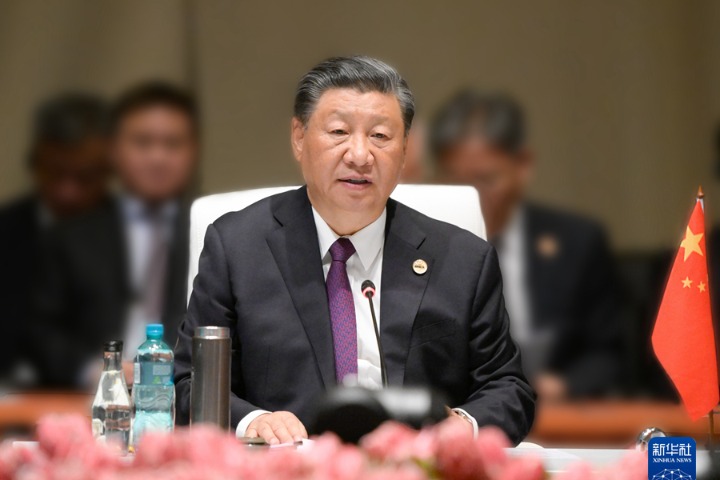



 英语点津微信
英语点津微信 双语小程序
双语小程序